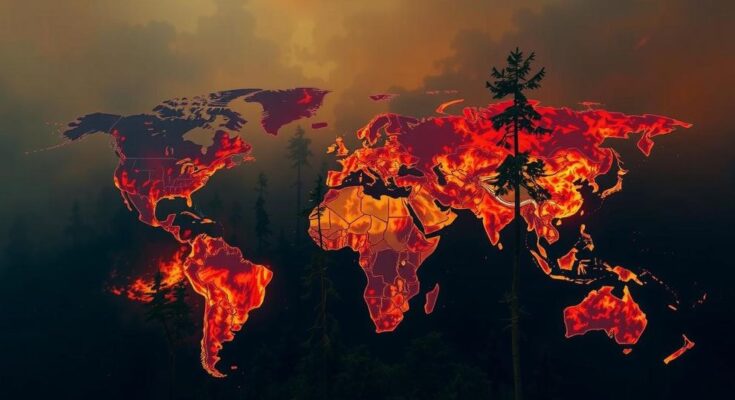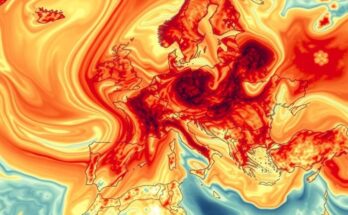Researchers have established a firm link between climate change and the rise in frequency and intensity of wildfires globally, noting a drastic increase in smoke-related deaths, from fewer than 669 annually in the 1960s to 12,566 in the 2010s. Studies show regional variations, with African wildfires declining due to human activities, while regions like California and Siberia experience increasing incidents. The studies stress the imperative for strict greenhouse gas reductions alongside effective land and fire management to address the risks posed by escalating wildfires.
Recent research has unveiled a significant correlation between climate change and the rising prevalence and severity of wildfires globally, contributing to a substantial increase in smoke-related fatalities over recent decades. Scholars from Dalhousie University, Belgium, the United Kingdom, and Japan conducted two thorough studies that systematically examined the extent of wildfires and their consequences for public health, observing deteriorating conditions for both. It is estimated that the annual deaths linked to wildfire smoke escalated from fewer than 669 in the 1960s to 12,566 in the 2010s. One investigation published in Nature Climate Change analyzed wildfire models both inclusive and exclusive of climate change effects, revealing an uptick in wildfire occurrences and intensity across various regions, particularly in vulnerable ecosystems like those in the African savannas, Australia, and Siberia. However, the study underscored significant regional disparities; notably, Africa—accounting for nearly 70 percent of the global burnt area—has experienced a decline in wildfires thanks to increased human activity and land fragmentation, which restricts fire spread. Conversely, forested regions, including California and Siberia, have seen rising fire incidents attributed to prolonged drought and elevated temperatures due to climate change. Dr. Sian Kou-Giesbrecht, an associate professor in Dalhousie’s Department of Earth and Environmental Sciences and co-author of both reports, stated, “The study is important because it shows and quantifies the influence of climate change on increasing wildfires worldwide, especially given the impacts of wildfire on society and its feedback to climate change.” Using comprehensive models that considered factors such as climate change, vegetation type, and population density, the researchers emphasized that while human interventions, like fire suppression and management practices, can mitigate fire incidences, they often remain insufficient to fully counteract climate change’s effects—particularly in years marked by extreme weather conditions. Seppe Lampe, a climate scientist at Vrije Universiteit Brussel, remarked, “What is striking is that in periods with low to moderate numbers of fires, direct human interventions have a large effect. However, in periods with many fires, the effect of climate change dominates.” The simulations indicated a nearly 16 percent global increase in the burned area between 2003 and 2019, with a 22 percent increased probability of experiencing months with above-average burn area. Furthermore, the impact of climate change on burned areas is expanding at a rate of 0.22 percent annually, particularly pronounced in Central Australia. A separate publication highlighted that climate change may have increased the proportion of smoke-related deaths attributable to wildfires by tenfold over the past fifty years—a phenomenon previously unquantified. Collaborating researchers, including those from the National Institute for Environmental Studies in Japan, utilized fire-vegetation models alongside chemical transport models to assess the health risks linked to fine particulate matter from wildfires between 1960 and 2019. Findings indicated that between one and three percent of wildfire deaths in the 1960s were linked to climate change, increasing to as much as 28 percent by the 2010s, with South America, Australia, Europe, and the Asian boreal forests exhibiting the highest mortality rates. Dr. Kou-Giesbrecht stated, “It can be tricky to attribute wildfire to climate change because of the complexities of the interactions… but in these international projects, we have made a robust attribution of wildfires to climate change using multiple models.” She cautioned that if the current trajectory of climate change persists, the expanse of burned territories and the consequent health repercussions will markedly escalate in the foreseeable future.
The relationship between climate change and the proliferation of wildfires has become increasingly evident, as scientific studies provide concrete data linking the two phenomena. The rising intensity and frequency of wildfires pose significant threats not only to ecosystems but also to human health, as evidenced by the remarkable increase in deaths associated with wildfire smoke. Understanding these dynamics is crucial for developing strategies aimed at mitigating wildfire risks and safeguarding public health, especially as climate conditions continue to evolve.
In conclusion, the findings from the recent studies underscore the profound impact of climate change on the occurrence and severity of wildfires worldwide. While human interventions have shown effectiveness in certain contexts, they are often inadequate to counterbalance the broader influences of climate change, particularly during extreme weather events. The increase in wildfire smoke-related mortality further emphasizes the urgent need for immediate action in reducing greenhouse gas emissions and managing landscapes effectively to mitigate the dire consequences of wildfires on human life and environmental health.
Original Source: www.dal.ca




